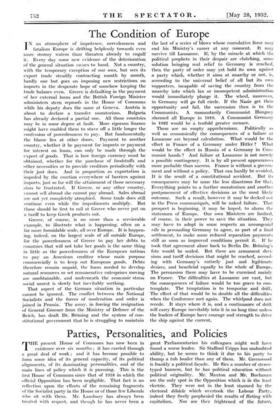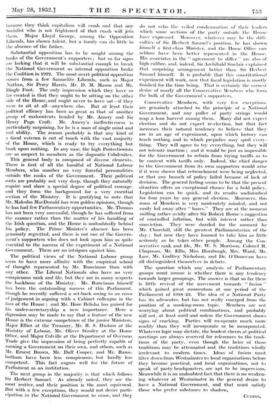Parties, Persona l
tes, and Policies • i
THE present House of Commons has now been in existence over six months ; it has carried through a great deal of work ; and it has become possible to form some idea of its general capacity, of its political alignments, of its dominating personalities, and of the main lines of policy which it is pursuing. This is the first House of Commons since that of 1918 in which the official Opposition has been negligible. That fact is no reflection upon the efforts of the remaining fragments. of the Socialist party in the House, or of those few Liberals who sit with them. Mr. Lansbury has always been treated with respect, and though he has never been a great Parliamentarian his colleagues might well hate found a worse leader. Sir Stafford Cripps has undoubted ability, but he seems to think it due to his party to thump a tub louder than any of them. Mr. Greenwood is frankly a political facade. He flies a number of stereo- typed banners, but he has political education without political originality. Mr. Maxton and Mr. Buchanan are the only spot in the Opposition which is in the least electric. They were not in the least stunned by the electoral &Ude which overtook the Labour Party, indeed they freely prophesied the results of flirting with capitalism. Nor are they frightened of the future,
because they think capitalism will crash and that any Socialist who is not frightened of that crash will join them. Major Lloyd George, among the Opposition Liberals, has shown talent, but a family can do little in the absence of the father.
Substantial opposition has to be sought among the ranks of the Government's supporters ; but so far signs are lacking that it will be substantial enough to break the National Government as internal opposition broke the Coalition in 1922. The most overt political opposition rows from a few Samuelite Liberals, such as Major Nathan, Sir Percy Harris, Mr. D. M. Mason and Mr. Dingle Foot. The only impression which they have so far created is that they ought to be sitting on the other side of the House, and ought never to have sat—if they were to sit at all—anywhere else. But at least their political efficacy has been as great as that of another group of malcontents headed by Mr. Amery and Sir Henry Page Croft. Mr. Amery's ineffectiveness is particularly surprising, for he is a roan of single mind and real ability. The reason probably is that any kind of a fiscal veteran is out of touch with the vast majority of the House, which is ready to try everything but hank upon nothing. In any case, the high Protectionists arc as suspect to members as the dogmatic Cobdenites.
This general body is composed of diverse elements. There is first of all the handful of National Labour Members, who number no very forceful personalities outside the ranks of the Government. Their political roots arc probably not very deep, though they naturally require and show a special degree of political courage, and they form the background for a very essential section of the Ministry. It is gratifying to note that Mr. Malcolm MacDonald has won golden opinions, though he has had few Parliamentary opportunities. Mr. Thomas has not been very successful, though he has suffered from the manner rather than the matter of his handling of the Irish question, and the House is undoubtedly behind his policy. The Prime Minister's absence has been genuinely regretted, and there is not one of the Govern- ment's supporters who does not look upon him as quite essential to the success of the experiment of a National Government. There are no intrigues against him.
The political views of the National Labour group seem to have more affinity with the empirical school of thought represented by Mr. Runciman than with any other. The Liberal Nationals also have no very conspicuous rank and file, but they are in many respects the backbone of the Ministry. Mr. Runciman himself has been the outstanding success of this Parliament. though he recently suffered a set:back owing to an error of judgement in arguing with a Cabinet colleague in the face of the-House ; and Mr. Hore Belisha has gained for his under-secretaryship a new importance. Here a digression may be made to say that a feature of the new House is the extreme competence of the junior Ministers. Major Elliot at the Treasury, Mr. H. S. Hudson at the Ministry of Labour, Mr. Oliver Stanley at the Home Office, and Major Colville at the Department of Overseas Trade give the impression of being perfectly capable of running a Government on their own, and others, such as Mr. Ernest Brown, Mr. Duff Cooper, and Mr. Rams- botham have been less conspicuous, but hardly less competent. This fact augurs well for the future of Parliament as an institution.
The next group in the majority is that which follows Sir Herbert Samuel. As already noted; they arc the most restive, and their position is the most equivocal. But with a few exceptions, they would not desire parti- cipation in the National Government to cease, and they do not echo the veiled condemnation of their leaders wlhic•lh some sections of the party outside the House have expressed. Moreover, whatever may be the diffi- culties of Sir Herbert Samuel's position. he has shown himself a first-class Minister, and the Home Office can seldom have been better represented in the House. His associates in the " agreement to differ are also of high calibre, and, indeed, Sir Archibald Sinclair explained that surprising arrangement better than Sir Herbert Samuel himself. It is probable that this constitutional experiment will work, now that fiscal legislation is mostly finished for the time being. That is certainly the earnest desire of nearly all the Conservative Members who form the bulk of the Government's supporters.
Conservative Members, with very few exceptions, are genuinely attached to the principle of a National Government. and any puller of party strings would reap a lean harvest among them. Many did not expect election and do not expect re-election, but that fact. increases their natural tendency to believe that they are in an age of experiment, upon which history can tends nothing and in which prejudice may spoil every- thing. They will agree to try everything, but they will not tolerate inaction ; and it would be just as impossible for the Government to refrain from trying tariffs as to be content with tariffs only. Indeed, the chief danger to the Government front its own supporters would arise if it were shown that retrenchment were being neglected, or that any branch of policy failed because of lack of decision. The general feeling seems to be that the present situation offers an exceptional chance for a bold policy. Legislation can be quick, and its results undisturbed for four years by any general election. Moreover, this mass of Members is very moderately minded, and not easily led away after " hares." They arc at the moment sniffing rather avidly after Sir Robert Homes suggestion of controlled inflation, but with interest rather than conviction. They were dazzled for the moment by Mr. Churchill, still the greatest Parliamentarian of the day ; but now they have learned to take him as little seriously as he takes other people. Among the Con- servative rank and file, Mr. W. S. Morrison, Colonel R. Chapman, Mr. Ellis, Miss Horsbrugh, Mrs. Ward, Mr. Law, Mr. Godfrey Nicholson, and Dr. O'Donovan have all distinguished themselves in debate.
The question which any analysis of Parliamentary groups must arouse is whether there is any tendency towards larger groupings. The answer is that so far there is little revival of the movement towards " fusion " which gained great momentum at one period of the Parliament of 1918-22. The idea of a National Party has its advocates, but has not really emerged from the position of a smoking-room topic. Members are not worrying about political combinations, and probably will not, at least until and unless the Government shows signs of cracking. Parties will co-operate much more readily than they will incorporate or be incorporated. Whatever logic may dictate, the loudest cheers at political meetings are always reserved for references to the tradi- tions of the party, even though the heirs of those traditions may be attenuated and the traditions wholly irrelevant to modern times. Ideas of fusion must filter down from Westminster to local organisations before they become practical, and local organisations, not to speak of party headquarters, arc apt to be impervious,. Meanwhile it is an undoubted fact that there is no weaken- ing whatever at Westminster in the general desire to have a National Government, and that must satisfy those who prefer substance to shadow.
CUSTOS.









































 Previous page
Previous page